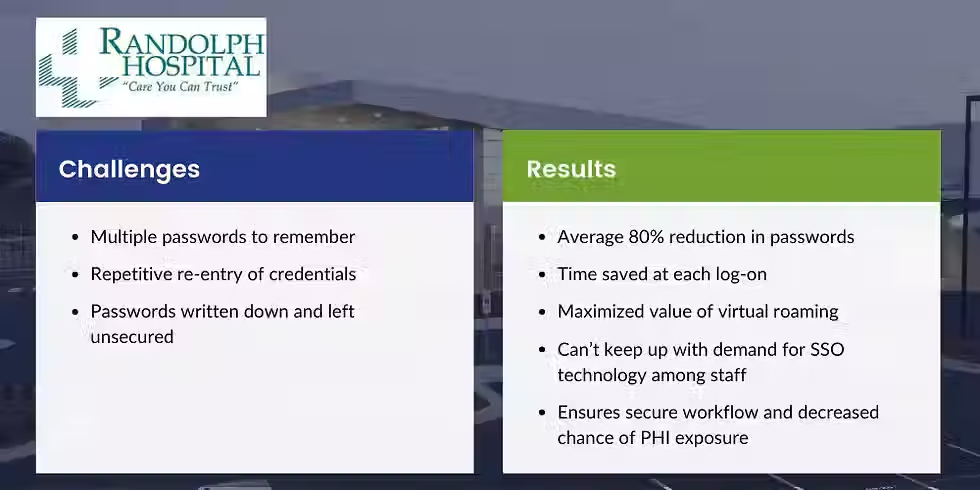Passwords and other security policies are a necessary part of the healthcare computing environment, but when they negatively impact physician workflow and the timeliness of patient care, something must be done. At Randolph Health (Asheboro, NC), physicians and other clinical staff were required to enter their credentials at each workstation. The logon was intrusive to their workflow and time-consuming for clinicians who are constantly on the move trying to deliver care.
Randolph turned to its long-time vendor Forward Advantage, which has successfully sold and implemented Imprivata's Enterprise Access Management solution for more than a decade. Their initial goal was to improve the computing workflow of a target group of 95 providers and 335 nursing and ancillary staff. The Enterprise Access Management deployment was coupled with a rebranding initiative that Randolph had recently undertaken to unify its multiple entities. As part of the rebranding, users were given new identification badges that were printed on proximity cards containing a chip that allows for workstation authentication via a “tap in” and “tap out” process. The implementation has been so successful that additional departments and end users are now requesting Enterprise Access Management. “It’s one of those rare technologies that people actually want, which leaves us trying to keep up with the demand,” says Kevin Buchanan, networking and infrastructure director at Randolph Health.
Convenience for busy physicians
Prior to single sign-on, Randolph’s physicians had an average of four passwords and clinical staff had an average of six. “Most of our user IDs are at least five digits long, and passwords have to be at least eight digits long,” says Angela Burgess, VP Operations and CIO at Randolph Health. “Entering this information is probably a ten second activity, which doesn’t sound like much, but it becomes very tedious when done at every log-on point.”
With Enterprise Access Management single sign-on, Randolph’s clinicians tap their badge to a workstation and enter a single password to log into their systems and applications. After this, a four-hour grace period goes into effect during which only a badge tap is required. The solution is a nice compliment to the Citrix virtual desktops Randolph had previously installed. It became clear that clinicians were not realizing the full benefits of virtual roaming without single sign-on, which is now integrated within this environment to maximize convenience and time savings. “We have computers deployed in all patient rooms, so physicians can now just tap in with their badges, and they’re ready to roll,” continues Burgess. “They can focus on the patient rather than the technology.”
Everyone wants it
Imprivata's Enterprise Access Management is deployed in several areas at Randolph, including inpatient nursing, the emergency department, respiratory therapy, and one physician clinic. Burgess is now considering implementing it within their maternity department, surgery, and special procedures unit. “It’s very rare in our work, but this technology is one that people actually ask for,” she states. “I never hear any complaints.” If there’s any downfall, it’s that funding hasn’t allowed Randolph to deploy single sign-on to everyone who wants it. “Unfortunately, word-of-mouth advertising has increased demand for Imprivata; departments that don’t have it, want it,” says Buchanan.
“Our consultant [Forward Advantage] understood the end user experience we were trying to achieve, and he helped us improve the whole end user experience, not just with Enterprise Access Management.” - Angela Burgess, VP Operations & CIO at Randolph Health
Organizations can’t afford a security breach
The security of a patient’s protected health information (PHI) is often a big concern for organizations without single sign-on. Passwords are often written down and left in unsecured locations, and clinicians are less inclined to log off workstations if they need to repeatedly re-enter their credentials. This increases the chance that PHI will be left out in the open, which is a risk that healthcare organizations can’t afford to take. “Single sign-on is huge from a security perspective,” says Burgess. “Now we don’t
have to worry about users not logging off or accidentally charting under someone else’s name. They’ve become very accustomed to tapping in and out with their badges, ensuring that they’re always working within the correct session.”
Forward Advantage knows Enterprise Access Management and healthcare
The project was customized to meet Randolph’s needs with regards to its virtual environment, and Forward Advantage is credited for having the necessary product and healthcare experience to make this possible. “We customized the Imprivata solution in a way that worked for us and have created an overall end-user experience where IT is not in the way,” says Buchanan. Burgess further credits Forward Advantage’s MEDITECH experience with Enterprise Access Management’s success. “It was beneficial to have a partner who knows MEDITECH and understands healthcare and the challenges we face,” she states. “I think another vendor would’ve answered our questions but not as quickly.”
“We sell solutions, not products,” says Lee Howard, vice president of client services for Forward Advantage. “Our healthcare experience, combined with our knowledge of Enterprise Access Management, ensures that the solution meets the unique needs of every customer.”
Interested in learning more about Enterprise Access Management?
